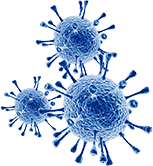Spoke 7 activities overview
Spoke 7 - Space for the sustainable development of the planet
Spoke 7 develops advanced methodologies, technologies and analytical tools to support sustainable development, environmental monitoring and the understanding of extreme hydro-meteorological and oceanic extremes. Its activities combine Earth Observation (EO), modelling, data assimilation, artificial intelligence and experimental research to address challenges related to climate, water resources, ecosystems, pollution, agriculture and the space economy. A key goal is to raise the technology readiness level (TRL) of low-TRL EO innovations into scalable tools that support decision-making for public institutions, industry and communities.
A first area of work focuses on advancing EO techniques for extreme weather. The Spoke develops AI-based and data-driven methods to improve near-real-time monitoring and short-term prediction of severe weather conditions, exploiting heterogeneous satellite datasets and big data approaches, including very short-term storm forecasting and multi-sensor hail detection and tracking.
Complementary work enhances data assimilation tools for non-conventional satellite observations that support meteorological, hydrological, oceanographic, air-quality and climate models, also through intensive field campaigns. Additional efforts address the automation of rapid-mapping procedures, incorporating data assimilation, 3D components and relocatable ocean modelling to support impact assessment during extreme events.
A further component investigates the climatology of weather and marine extremes, developing data-driven prediction tools and analysing long-term variability and recurrence patterns.
Building on these capabilities, the Spoke develops innovative solutions for sustainable water and food systems. Activities include the creation of new algorithms for monitoring water reserves, water quality and marine ecosystems, as well as the dynamic observation of land cover, soil characteristics, vegetation and agricultural processes. The work integrates satellite data, surface networks and numerical models to estimate biophysical indicators, soil moisture, irrigation needs and crop productivity.
The Spoke also develops new indicators based on hyperspectral, multispectral, radar and GNSS-R data, establishes virtual laboratories for algorithm testing, and explores advanced EO-based methods for monitoring lakes, rivers, lagoons and transitional ecosystems.
A complementary line of research focuses on enabling a zero-emission society. Here, the Spoke develops new methods for monitoring air pollution, marine pollution and emission sources in urban and agricultural contexts, including fine-scale greenhouse gas monitoring such as methane plume detection. Additional efforts address urban and suburban environmental processes through data-fusion techniques that support studies of heat islands, microclimate, land use, deformation monitoring, and solar-energy potential.
Activities also include innovative approaches for mapping the carbon cycle, estimating above-ground biomass, and detecting forest disturbances such as fires or wood removals, using next-generation satellite sensors and AI-based techniques.
To support sustainable economic growth, the Spoke studies the evolution of the New Space Economy, analysing business-model innovation, entrepreneurial dynamics and the creation of innovation ecosystems. It also develops methodologies for the techno-socio-economic assessment of satellite-based applications and services, translating user needs into technical requirements for future multi-orbit, multi-mission EO infrastructures.
Complementary work addresses the legal and policy dimensions of Earth Observation, including data governance, privacy, responsible use of EO information and the regulatory implications of using EO to support sustainable policies.
The Spoke also carries out extensive experimental research, integrating satellite data, field measurements and advanced modelling. Activities include the development of AI techniques for coastal forecasting and rapid mapping of extreme-event impacts, the production of satellite-derived maps of atmospheric constituents and water-stress indicators, and the creation of new procedures for agricultural monitoring, organic certification and food traceability.
Additional work involves the management of calibration and validation campaigns, satellite and auxiliary data processing, instrument design, and the development of distributed sensor networks for environmental monitoring. These activities support algorithm testing, data assimilation and the optimization of EO-based indicators for a wide range of environmental and climatic applications.
Across all tasks, the Spoke advances the technology readiness level (TRL) of the developed methods, data-processing workflows, EO products, sensor concepts and modelling tools, ensuring their applicability to real-world scenarios and their integration into operational frameworks for climate resilience, sustainable development and societal benefit, in line with international sustainability agendas, including the UN Sustainable Development Goals (SDGs).
Research activities Details
Publications
2025
Journal publications:
- eeee
Conference publications:
- eee
2025
Journal publications:
- eeee
Conference publications:
- eee
Spoke 7 - Space for the sustainable development of the planet
Spoke 7 develops advanced methodologies, technologies and analytical tools to support sustainable development, environmental monitoring and the understanding of extreme hydro-meteorological and oceanic extremes.
Its activities combine Earth Observation (EO), modelling, data assimilation, artificial intelligence and experimental research to address challenges related to climate, water resources, ecosystems, pollution, agriculture and the space economy. A key goal is to raise the technology readiness level (TRL) of low-TRL EO innovations into scalable tools that support decision-making for public institutions, industry and communities.
A first area of work focuses on advancing EO techniques for extreme weather. The Spoke develops AI-based and data-driven methods to improve near-real-time monitoring and short-term prediction of severe weather conditions, exploiting heterogeneous satellite datasets and big data approaches, including very short-term storm forecasting and multi-sensor hail detection and tracking.
Complementary work enhances data assimilation tools for non-conventional satellite observations that support meteorological, hydrological, oceanographic, air-quality and climate models, also through intensive field campaigns. Additional efforts address the automation of rapid-mapping procedures, incorporating data assimilation, 3D components and relocatable ocean modelling to support impact assessment during extreme events.
A further component investigates the climatology of weather and marine extremes, developing data-driven prediction tools and analysing long-term variability and recurrence patterns.
Building on these capabilities, the Spoke develops innovative solutions for sustainable water and food systems. Activities include the creation of new algorithms for monitoring water reserves, water quality and marine ecosystems, as well as the dynamic observation of land cover, soil characteristics, vegetation and agricultural processes. The work integrates satellite data, surface networks and numerical models to estimate biophysical indicators, soil moisture, irrigation needs and crop productivity.
The Spoke also develops new indicators based on hyperspectral, multispectral, radar and GNSS-R data, establishes virtual laboratories for algorithm testing, and explores advanced EO-based methods for monitoring lakes, rivers, lagoons and transitional ecosystems.
A complementary line of research focuses on enabling a zero-emission society. Here, the Spoke develops new methods for monitoring air pollution, marine pollution and emission sources in urban and agricultural contexts, including fine-scale greenhouse gas monitoring such as methane plume detection. Additional efforts address urban and suburban environmental processes through data-fusion techniques that support studies of heat islands, microclimate, land use, deformation monitoring, and solar-energy potential.
Activities also include innovative approaches for mapping the carbon cycle, estimating above-ground biomass, and detecting forest disturbances such as fires or wood removals, using next-generation satellite sensors and AI-based techniques.
To support sustainable economic growth, the Spoke studies the evolution of the New Space Economy, analysing business-model innovation, entrepreneurial dynamics and the creation of innovation ecosystems. It also develops methodologies for the techno-socio-economic assessment of satellite-based applications and services, translating user needs into technical requirements for future multi-orbit, multi-mission EO infrastructures.
Complementary work addresses the legal and policy dimensions of Earth Observation, including data governance, privacy, responsible use of EO information and the regulatory implications of using EO to support sustainable policies.
The Spoke also carries out extensive experimental research, integrating satellite data, field measurements and advanced modelling. Activities include the development of AI techniques for coastal forecasting and rapid mapping of extreme-event impacts, the production of satellite-derived maps of atmospheric constituents and water-stress indicators, and the creation of new procedures for agricultural monitoring, organic certification and food traceability.
Additional work involves the management of calibration and validation campaigns, satellite and auxiliary data processing, instrument design, and the development of distributed sensor networks for environmental monitoring. These activities support algorithm testing, data assimilation and the optimization of EO-based indicators for a wide range of environmental and climatic applications.
Across all tasks, the Spoke advances the technology readiness level (TRL) of the developed methods, data-processing workflows, EO products, sensor concepts and modelling tools, ensuring their applicability to real-world scenarios and their integration into operational frameworks for climate resilience, sustainable development and societal benefit, in line with international sustainability agendas, including the UN Sustainable Development Goals (SDGs).



